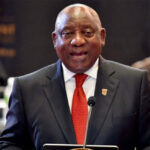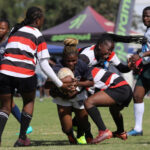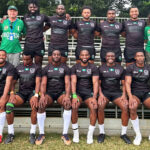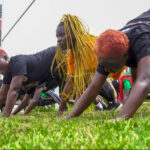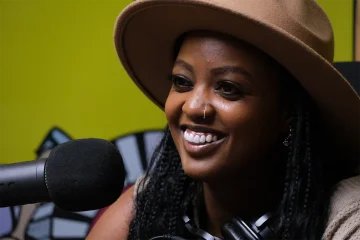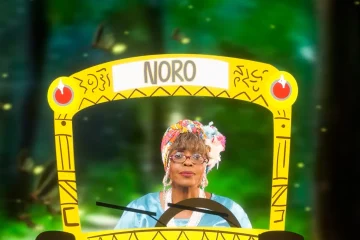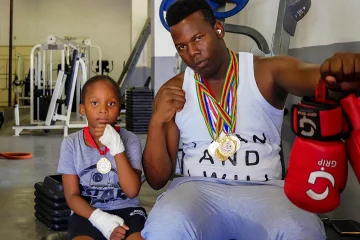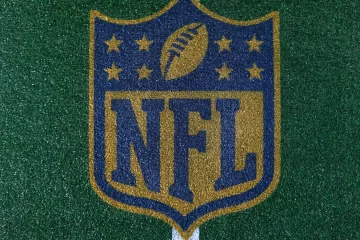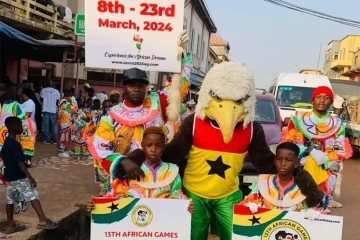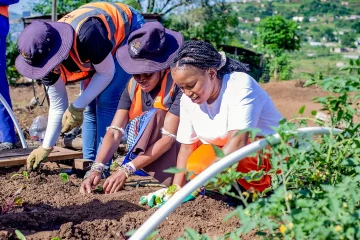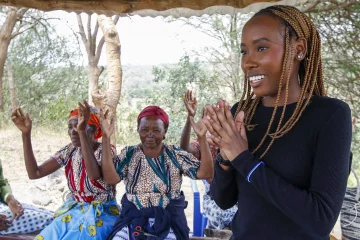IN April 2023, an all-Black women’s rugby team, led by Head Coach Bongi Nhleko from the University of Johannesburg (UJ), progressed to the first-ever First National Bank (FNB) Varsity Women’s Rugby Finals. It was a seminal moment for Black women’s rugby in South Africa.
“We were really honoured to be part of the first-ever Varsity Cup’s Fifteens and we were grateful for it. It gave us exposure because going through to the finals we knew there was going to be pressure and we were looking to perform… It was a great experience… It wasn’t the result we were looking for but it was a great experience for the coaches and the girls too,” Nhleko shared after the experience, which saw UJ lose against a Stellenbosch University women’s side.
Another seminal moment – and one with political as well as sporting consequences – occurred in 1995, when then-president Nelson Mandela handed the Webb Ellis Cup to South African captain Francois Pienaar after South Africa won the World Cup. Until that moment, rugby in South Africa had been seen as male, and white. Due to the racist policies of its Apartheid government, the country was excluded from international competition for decades and had only been re-admitted after the country’s first democratic election, in 1994.
After 1995, men’s rugby became more representational – but it has taken decades longer for women’s rugby to gain momentum. And while rugby is starting to be seen as a women’s game, it gets far less attention in South Africa than women’s football or even cricket. According to experts, that has a lot to do with sports development and how sports are funded.
“The options available to women are very limited. I think options in terms of sporting opportunities in South Africa are generally limited in comparison with more developed countries like the UK, for example, where there is tons of funding and opportunity and development across a wide range of sporting codes,” said Elma Smit, author, World Rugby presenter and content creator.
The country’s huge focus on football has seen women’s representation in that sport develop apace, with the country’s women’s team, Banyana Banyana doing South Africa proud at the women’s World Cup in 2023 – much to the delight of the entire nation. Women’s rugby – and the participation of Black women in the sport – lagged.
However, as noted by World Rugby, by 2022, women’s rugby was one of the fastest-growing team sports on the planet, with more than 2.7 million women and girls playing the game. This growth is reflected at the Golden Lions Rugby Union – a South African professional rugby union team based in Johannesburg – which has seen the number of women senior players increase by 118 percent since 2015, while the number of junior women’s teams increased by 364 percent in 2019 compared to 2015.
And thanks to the efforts of women like Coach Nhleko – and the optics associated with an all-Black women’s team in the finals of the Varsity Women’s league – the representation of Black women in the sport is changing, too.
“We have fought hard over the years to have our voices heard,” said Nhleko, whose journey with the sport began in 2008 when she started out as a touch-rugby player.
After years of experience playing touch rugby (a derivative of rugby that uses touch rather than body tackles to halt play), Nhleko pivoted her career to regular rugby in 2015. She started out as a player with the Pirates Women’s Rugby team and was offered her current position in 2020, but due to the Covid pandemic, did not get to do much coaching until 2021.
While Nhleko lauds recent successes for women’s rugby and for Black participation, women athletes worldwide face ongoing discrimination in how they access, participate, and are supported in, their sporting undertakings. The 2023 Women’s Soccer World Cup tournament highlighted the vast disparities between men and women players’ remuneration, for example.
While South Africa’s Springbok Women’s Sevens team are looking forward to taking part in their first-ever Olympic Games in Paris in 2024 after qualifying at the Rugby Africa Women’s Sevens in Tunisia, Nhleko, emphasised the need for further improvement in the amount of support provided to women’s rugby.
“The preparation for the female South African rugby teams is looking really promising. Unfortunately, though, we are still lacking the funding necessary to pay the players as the men’s side does for doing what they love and giving South Africans a good game that they hold dear to their hearts,” she said.
She explained that the resources would need to be spent on coaching facilities and staff as well as the teams.
“This is not only limited to the literal players but also extends towards the administrative side of things; coaches and other influential people that all come together to ensure everything runs smoothly… and training young, budding women into fulfilling their sporting dreams,” Nhleko said.
While Pienaar launched the FNB Varsity Cup league in 2008, it would take another 15 years for the creation of the Varsity Women’s League. And while his team won the World Cup in 1995, it was not until 2004 that the South African women’s Springbok National Rugby Team was formed.
Mandisa Williams, former Springbok women’s captain, Bulls Daisies assistant coach and SuperSport commentator, echoed Nhleko’s words and added a word of warning.
“Development of women and girls, women’s coaches and others is of vital importance for any rugby union if they require backing from World Rugby,” Williams said
“The South African government needs to invest in university sports. Women’s club rugby is not a sustainable development. University sport could be prioritised and South African teams could benefit from it,” Williams added.
In South Africa, women usually only encounter rugby at university, with girls at the school level only allowed to participate in certain sporting codes (even to the exclusion of football, in many instances).
“We need school and varsity rugby, which will be feeder to senior Premier League and South African teams,” Williams explained.
“International women players begin their journey as early as five years old, and yet in South Africa, players can only start playing in grade ten.” Paul Delport, the former coach of the Springbok Women’s Sevens team, told Cape Talk Radio.
The lack of exposure on media platforms is an additional challenge that women in sports must contend with.
“With rugby being the fastest growing sport in relation to women, there is little coverage to broadcast our challenges and triumphs within the sport,” Nhleko shared.
Despite the challenges plaguing girls and women in rugby, there are a few new rules that give Smit and Williams hope for the future.
“What we all want to see more of, as we head into 2025, is the impact of regular game time through Women’s Fifteen (WXV, World Rugby’s newly-launched annual three-tier global women’s tournament) reaping rewards for countries outside of the Pacific Four Competition and W6 Nations,” Smit remarked.
“The next three-to-five years will slowly brew something of greatness because of World Rugby’s stance that by 2025 all provincial women rugby players need to be semi or [fully] professional, they say. If done for boys it can be done for girls and women too,” Williams said.
Nhleko’s hope is that when it comes to compensation, the new rules will level the playing field.
“There is no shortage of women in sports that are out there, training hard and doing their utmost to represent their country. It is well-known that women have been thought of as the minority class for quite some time… It is my dream that we can be serviced with the same recognition, as well as the financial aspect that we all know is an inevitable part of today’s society,” she concluded.









